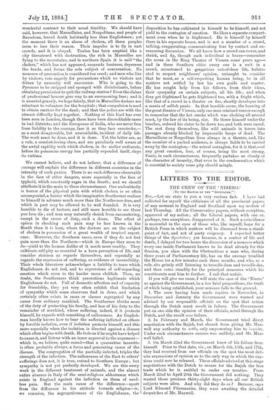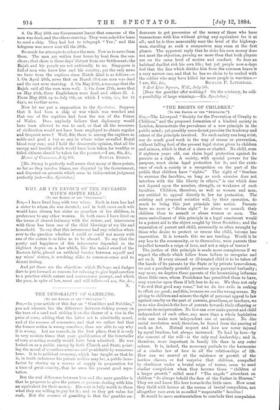LETTERS TO THE EDITOR.
THE CREW OF THE NISERO.'
[TO THE EDITOR OF THE "SPECTATOR."]
Sin,—Let me state to you a very curious fact. I have had collected for myself the criticisms of all the provincial papers of any moment in England and Scotland upon my motion of last Thursday. All the Conservative papers, without exception, approved of my action ; all the Liberal papers, with one or, perhaps, two exceptions, disapproved of it. Such a coincidence is mournful in the eyes of those who, like myself, hope for a British Press in which matters will be discussed from a stand- point of fact, and not of party exigency. I expected better things of the Spectator; yet because, in a matter of life and death, I delayed for two hours the discussion of a measure which every one inside Parliament knows to be dead already for this Session, you class with the Obstructives a man who, during three years of Parliamentary life, has on the average troubled the House for a few minutes each three months, and who, as a rule, sits grimly still listening to tweedle-dum and tweedle-dee, and then votes steadily for the principal measures which his constituents sent him to further. I call that unfair.
If you will give me room, I will state the case of the Nisero' as against the Government, in a few brief propositions, the truth of which being established, your censure falls to the ground.
1. The crew having been made captive in November, in December and January the Government were warned and advised by our responsible officials on the spot that action through the Dutch must result in failure. The Government put on one side the opinion of their officials, acted through the Dutch, and the result was failure.
2. In February and March, the Government tried direct negotiation with the Rajah, but shrank from giving Mr. Max- well any authority to settle, only empowering him to inquire. Under such circumstances success was unlikely, and Mr. Max- well failed.
3. On March 22nd the Government knew of his failure from himself. Prior to that date, viz., on March 6th, 13th, and 17th, they had received from our officials on the spot the most defi- nite expressions of opinion as to the only way in which the cap- tives could now be released. These officials advised at this stage negotiations with the Dutch to secure for the Rajah the free trade which he is entitled to under our treaties. From
March 22nd to April 29th the Government did nothing. They wasted these precious thirty-eight days when all our British subjects were alive. And why did they do so P Because, says Lord Edmond Fitzmaurice, they were awaiting the detailed despatches of Mr. Maxwell.
4. On May 26th our Government learnt that someone of the men was dead, and the others starving. They were asked for leave to send a ship. They had but to telegraph " Yes ;" and this telegram was never sent till the 29th.
So much for attempts to release the men. Now as to news from them. The men are within four hours by boat from the sea- shore ; that shore is three days' distant from our Settlement; the Rajah and his people are not unfriendly to us. Singapore is full of men who know him and his country, yet the only news we have from the captives since March 22nd is as follows :- I. On April 26th, news that on March 31st one man was dead and the rest were starving. 2. On May 20th, a message that the Rajah said all the men were well. 3. On June 27th, news that on May 26th, three Englishmen were dead and others ill. 4. From May 26th up to July 9th, on which I write, i.e., for 44 days, no further news.
Now let me put a supposition to the Spectator. Suppose that it had been a ship of war which was wrecked and that one of the captives had been the son of the Prince of Wales. Does anybody believe that diplomacy would have been allowed to run to seed, or that all the resources of civilisation would not have been employed to obtain regular and frequent news ? Well, Sir, there is among the captives as noble and good a boy as any in whose veins so-called Royal blood may run ; and I hold the democratic opinion, that all the energy and trouble which would have been taken for wealthy or titled citizens should be taken for the poorest.—I am, Sir, &c., [Mr. Storey is perfectly well aware that many of these points, so far as they involve blame, are disputed by the Government, and disputed on grounds which seem to independent judgment perfectly just.—ED. Spectator•.]

































 Previous page
Previous page